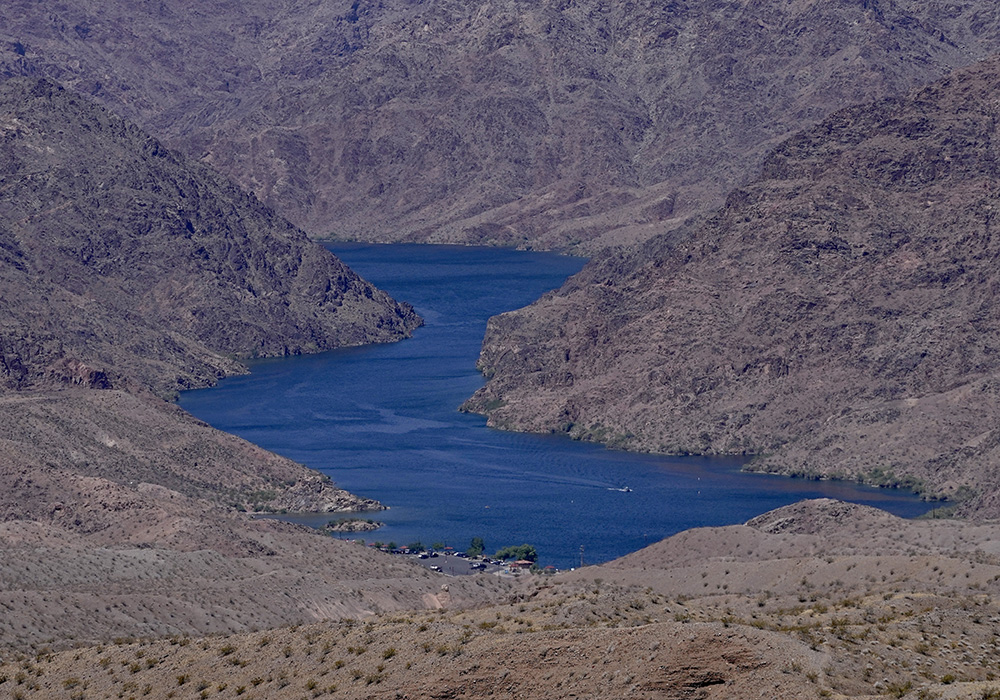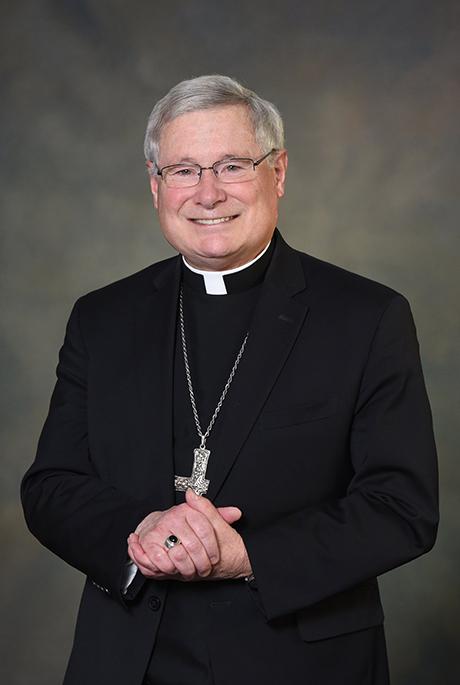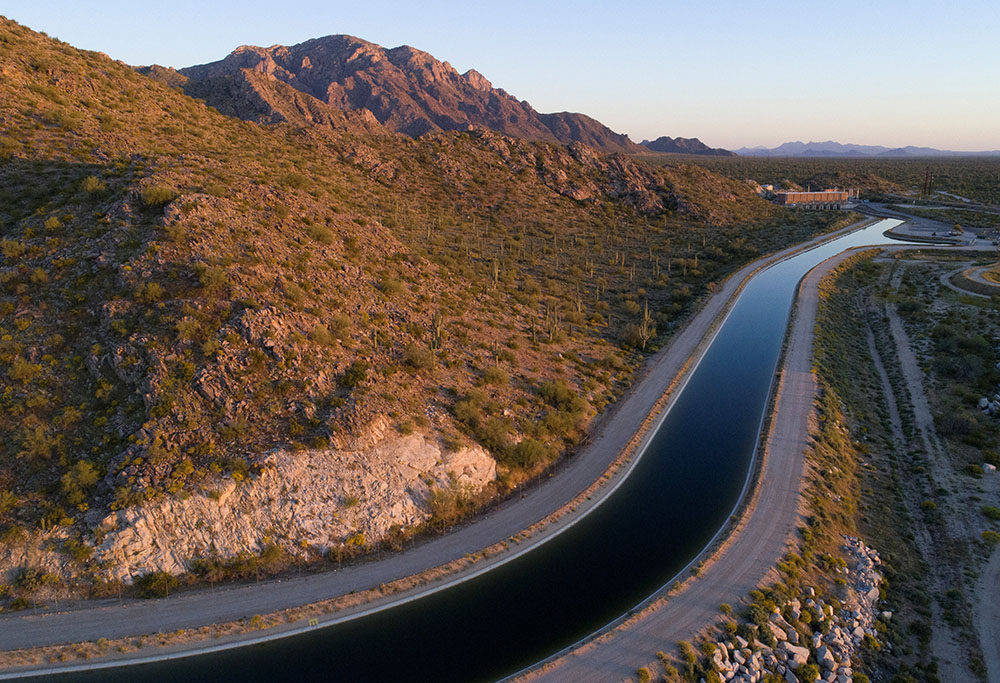
The Colorado River cuts through Black Canyon June 6, 2023, near White Hills, Arizona. (AP photo/Matt York)
The U.S. Catholic bishops' conference bemoaned pollution and injustice filling the nation's rivers and streams in a message for the 2023 Season of Creation, issued as the Biden administration weakened rules governing U.S. waterways to comply with a recent Supreme Court decision.
Archbishop Borys Gudziak and Bishop David Malloy, chairs of the domestic and international justice and peace committees for the U.S. Conference of Catholic Bishops, wrote in a statement released Aug. 29 that many of the watersheds across the United States have long been vital streams of life, beauty, connection and economic growth. But their currents have also carried more harmful cargo.
"The abundant waterways of our country have brought productive farms and flourishing urbanizations. Yet along with economic prosperity and ingenuity, our waterways have been filled with pollution, contamination, and garbage bringing injustice to peoples, creatures, and ecosystems. We must change!" they wrote in a reflection on this year's Season of Creation theme, "Let Justice and Peace Flow."
Archbishop Borys Gudziak of the Ukrainian Catholic Archdiocese of Philadelphia gestures during an interview with Catholic News Service at the headquarters of the U.S. Conference of Catholic Bishops March 14, 2022, in Washington. (CNS photo/Bob Roller)
The two bishops' conference chairmen urged such change in the form of ecological conversion both in personal lifestyles and public policy around environmental justice and climate change.
"The ecological conversion of hearts and changes in lifestyles are important for us as individuals and our holiness, but it is the public policy decisions about collective impacts that will significantly change the course of our environmental future," the bishops said.
The message of the U.S. bishops' conference was released the same day that the U.S. Environmental Protection Agency and U.S. Army issued a final, scaled-back rule defining "waters of the United States" that significantly reduced which watersheds are protected under the 1972 Clean Water Act. EPA officials said the move was a result of a decision in May by the U.S. Supreme Court, which limited regulated wetlands to those with continuous, surface-level connections to larger navigable bodies of water.

Bishop David Malloy of Rockford, Illinois, is pictured in a March 2022 photo. Malloy is chairman of the U.S. Conference of Catholic Bishops' Committee on International Justice and Peace. (OSV News/Brian Thomas Photography, courtesy of Diocese of Rockford)
The new rule could remove federal protections for 1.2 million to 4.9 million miles of the nation's ephemeral streams, which flow following precipitation events, and as much as 63% of wetland acreage, according to a report by The Washington Post citing an EPA official.
The river was selected as the symbol of this year's Season of Creation, an ecumenical period that runs from Sept. 1, the World Day of Prayer for the Care of Creation, to Oct. 4, the feast of St. Francis of Assisi. Organizers have invited Christians "to join the river of justice and peace" by speaking out on behalf of communities most impacted by climate change and biodiversity loss. Events include prayer services, educational symposia and an event endorsing a global fossil fuel non-proliferation treaty. Participants are also invited to pray for action from world leaders at the United Nations climate summit, COP28, in Doha, Qatar, in December.
Since 2019, Pope Francis has encouraged Catholics to join in celebrating the season. In his own message, released in May, the pope called on world leaders to cease the "madness" of new fossil fuel extraction and "to put an end to the senseless war against creation."
Advertisement
At his general audience in St. Peter's Square on Wednesday (Aug. 30), Francis announced that he will issue on Oct. 4 an apostolic exhortation updating his landmark encyclical "Laudato Si', on Care for Our Common Home" to reflect on the extreme weather facing vast parts of the world.
Climate change has exacerbated challenges posed by water across the country. In Florida's Gulf Coast, residents braced as Hurricane Idalia made landfall Wednesday after quickly strengthening to a Category 3 storm. While climate scientists are cautious to link climate change with a single storm, patterns of increasingly warm ocean waters, including around Florida, provide fuel for hurricanes to intensify more rapidly.
In the West, 40 million people in seven states face a looming water crisis as the Colorado River dries up from overuse and a historic drought. Elsewhere, lakes such as Lake Powell and Utah's Great Salt Lake, have fallen to dangerously low levels, in some cases revealing once-sunken ships and human remains.

The Colorado River water runs through Central Arizona Project canals in Pinal County, Arizona, April 9. (OSV News/Rebecca Noble, Reuters)
The bishops in their statement said the nation "must pursue rapid decarbonization" as part of "an energy revolution" in order to seriously address climate change, such as through the Inflation Reduction Act's historic clean energy investments that the U.S. bishops' conference endorsed. But those efforts cannot be conducted "on the backs of the poor and under-privileged" both at home and abroad, they said.
"We recognize this pursuit takes place amidst the complex threats of an increasingly multipolar world, with wars and threat of wars and other critical considerations of justice to our common home and the most vulnerable. This dilemma cries out for greater discernment and action to address both 'the cry of the earth and the cry of the poor,' " the U.S. prelates wrote.
Along with engaging in civic life, which they said is essential for integral ecology, the bishops urged Catholics to seek simplicity in their lives, especially in the U.S. where "we face a perennial temptation to live beyond our needs" even as income gaps widen between the economically rich and poor.
"An ecological lifestyle is not about pauperism or austerity, but an invitation to modesty and simplicity that increases our freedom to live as we ought regardless of our economic means," the bishops said. "To live simply allows both the poor and rich to share in a common solidarity with each other and with creation, remembering where all resources ultimately come from."







